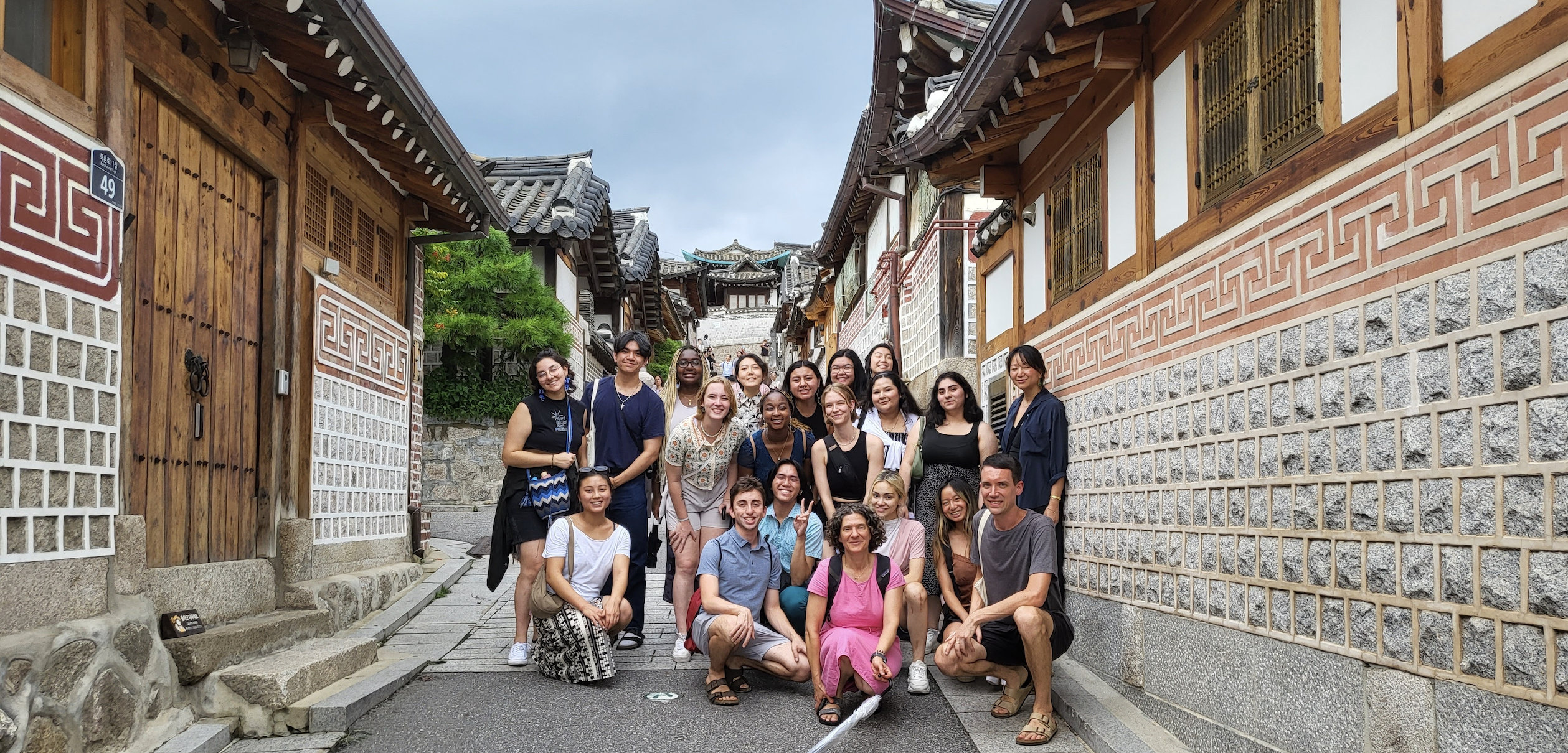Kangnam Style: South Korea’s Soft Power Empire
Program Quick Facts
- Location: Seoul, South Korea
- Faculty Leader: Dafna Zur
- Arrival Date: August 30, 2024
- Departure Date: September 20, 2024
- Program Cost: $600
- Academic Prerequisites: N/A
- Activity Level: Light/Moderate. Activities will include long walking hours in the city, as well as an occasional physical activity such as hiking.
- Centers for Disease Control and Prevention: Health Information for Travelers to South Korea
- US State Department Country Information: South Korea International Travel Information
- Visa Information: Consulate General of the Republic of Korea
- Application Deadline: Monday, January 29, 2024 at 11:59 am PT
General Description
South Korea has become a driver of pop culture and art. The musical/audio-visual genre known as K-pop has become globally mainstream, Korean dramas reach viewers around the globe, the K-beauty routine is championed by online influencers, and Korean fine arts dominate in the international arena. In this seminar, students will become familiar with South Korea’s economic, social, and political history that enabled these astonishing developments. Through field trips we will explore the following questions: Who are the people driving Korea’s “K-” industries? How can we understand its sustained success? At what cost has Korea achieved dominance in this field? Students will visit the centers of South Korea’s art establishment and entertainment industries, and will meet executives, performers, and contemporary artists. Students will contemplate the relationship between history and culture, and will interrogate the boundaries between the authentic and artificial.
Learning Objectives
- Gain a general grasp of major historical shifts in Korea’s modern history
- Become familiar with foundational concepts from cultural studies, and apply critical analysis to cultural texts
- Interrogate boundaries separating art, popular culture, and technology
- Engage critically with social and economic fallouts related to South Korea’s cultural industries.
The weekly onsite program will generally include:
- ~12 weekly hours of lectures and discussion
- Daily field trips to museums and centers of Korean popular culture
- Meetings with artists and entertainers
- Engagement with Korean students studying media and culture
Location
The seminar will take place mostly in Seoul.
Living and Travel Conditions
Students should understand that the conditions in certain locations can present difficulties and challenges not encountered here at Stanford University. Students should be prepared for a varying level of lodging, lack of amenities, new climate, new foods, and having less privacy and personal space than they are used to at the home campus.
Seoul is a vibrant, loud, crowded city, and students should be prepared to be overwhelmed by sights, sounds, and smells. The country is fast-paced, and the seminar will reflect that. Students will be expected to arrive with plenty of energy and stamina. The culinary scene in Korea is one of the best in the world–food is abundant and food options are diverse. At the same time, vegan and vegetarian options may sometimes be limited. Kosher and Halal food is nearly impossible to guarantee.
Students who have concerns about the specific living and traveling conditions should consult with the Bing Overseas Studies Program before submitting their application.
Faculty
Dafna Zur
Dafna Zur is an Associate Professor in the Department of East Asian Languages and Cultures at Stanford University, and is the current Director of the Center for East Asian Studies. At Stanford she teaches courses on Korean literature, cinema, and popular culture, as well as the core course of the MA program on East Asian Studies. Her first book, Figuring Korean Futures: Children’s Literature in Modern Korea (Stanford University Press, 2017), interrogates the contradictory political and social visions made possible by children’s literature in colonial and postcolonial Korea. She is working on a new project on narrative that brings together music, science, space, and self-writing in Korea. She has published articles on North Korean popular science and science fiction, North Korean translations, the Korean War in North and South Korean children’s literature, childhood in cinema, and Korean popular music and dramas. Her translations of Korean fiction have appeared in wordwithoutborders.org, The Columbia Anthology of Modern Korean Short Stories, and the Asia Literary Review.
In the summer, Dr. Zur directs the immersion camp known as The Korean Language Village, and is always looking to recruit college students who are interested in language education and leadership opportunities. Under her leadership, the program has grown past its current capacity, and will someday move into its permanent home on Turtle River Lake near Bemidji.
Prerequisites and Expectations
Students are encouraged to take Korean studies courses taught by Profs. Dafna Zur, Yumi Moon, and Gi-Wook Shin, or to enroll in Korean language at Stanford. Students with experience of prior living in or extensive travel to Korea will have lower priority.
Grading Basis
Letter Grade
